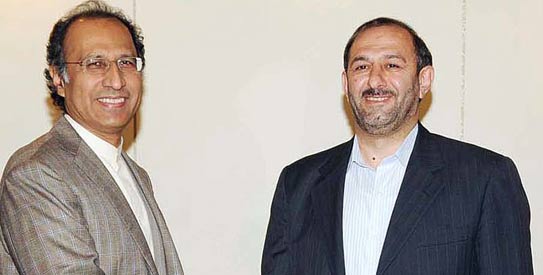
ISLAMABAD: President Asif Ali Zardari told an Iranian delegation on Tuesday that Pakistan was committed to an early implementation of Iran-Pakistan gas pipeline project.
Iran’s Vice President Ali Seedlou, who led the Iranian delegation, said his country had already laid the pipeline on its side of the border and was ready for full implementation of the project.
On the occasion, President Zardari said that besides an expeditious implementation of the pipeline project, Pakistan wanted to carry forward the proposed projects of 1,000MW Taftan-Quetta transmission line and 100MW Gwadar power supply project.
He said his government was pursuing a trade liberalisation policy and proposed elimination of tariff and non-tariff barriers between the two countries to further boost trade ties.
The president was quoted as saying: “The recent agreement between the two countries to work towards expanding the Pakistan-Iran Preferential Trade Agreement to include additional items form both sides and making it an agenda item for the next meeting of the trade committee was a welcome move to enhance trade links between the two countries.”
He said that enhancing bilateral cooperation, particularly in energy, security, communication and infrastructure, would help the two countries to overcome the challenges in the way of realisation of full existing potential of their equation and to realise the goal of raising the bilateral trade to $5 billion.
Minister for Commerce Amin Fahim, Adviser to Prime Minister on Finance Dr Hafeez Sheikh, Interior Minister Rehman Malik, former law minister Babar Awan, Secretary General to the President Salman Faruqui, federal secretaries of foreign affairs, petroleum and economic affairs division and other senior officials attended the meeting.
The Iranian vice president was accompanied by senior foreign office officials. The Iranian ambassador to Pakistan Alireza Haghighian was also present.
The two sides agreed that they were poised to play an important role in the promotion of intra-regional and inter-regional connectivity which was the key to the socio-economic development of the people of the region.
“Our resource constraints can be overcome by joining hands and enhancing cooperation in all the areas particularly trade, energy, horticulture, livestock, communication, infrastructure development and engineering sector,” said President Zardari.
The two sides agreed to set up a joint working group and hoped that the proposed visit of a delegation of Iranian banks to meet Pakistani counterparts would give impetus to the cooperation in the banking sector besides facilitating bilateral trade.
Pakistan’s side offered multiple entry visas to the businessmen from Iran on a reciprocal basis.















































Dear visitor, the comments section is undergoing an overhaul and will return soon.